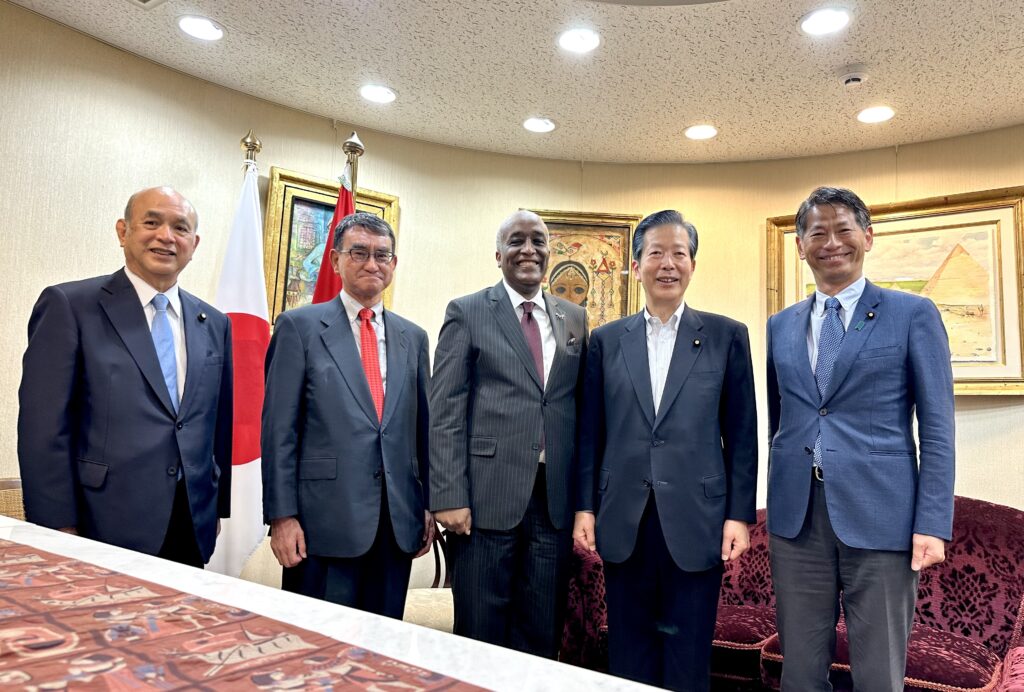
- ARAB NEWS
- 06 Jul 2025

Japan’s Deputy Minister of Foreign Affairs, TSUGE Yoshifumi, lauded the expanding relationship with Egypt at celebrating Egypt’s National Day in Tokyo. He highlighted the significant advances in politics, security, economy, education, culture, and international peace, underscoring Egypt’s promising development.
The event, held at the Embassy in Tokyo, was attended by key figures from the Japanese political and economic community and diplomats. They included Digital Minister KONO Taro, YAMADA Kenji, the Secretary General of the Japan-Egypt Parliamentary Association, Komeito Party leader YAMAGUCHI Natsuo, Japan Bank for International Cooperation Governor HAYASHI Nobumitsu, and Egyptologist YOSHIMURA Sakuji.
Tsuge congratulated Egypt on behalf of the Japanese government and conveyed warm wishes for President Abdel Fattah el-Sisi at the start of his third term, Prime Minister Madbouly, and the inauguration of the new cabinet.
“Under the leadership of President Sisi, I am confident that Egypt, which has a long history and a population of more than 100 million, will further develop and continue to play an important role in regional peace and stability,” said Tsuge, who pointed out that this year marks 70 years of cooperation between the two countries.
Japan has cooperated in various projects with Egypt, including the Cairo Opera House, the Suez Canal Peace Bridge, the Cairo Metro Line 4 and the Great Egyptian Museum. It has also collaborated on education, introducing Japanese-style engineering education and scholarships at the Egyptian Japanese University of Science and Technology.
On behalf of Egypt’s president and government, Ambassador Mohamed Abubakr expressed his “profound admiration and deep respect to their Imperial Majesties, the government, and the people of Japan for their continued friendly relations.” He said this mutual respect is a testament to the strength of our diplomatic ties.
Ambassador Abubakr noted the milestone in relations between the two countries, Prime Minister KISHIDA Fumio’s visit to Egypt last year and the second year of the Japan-Egypt Strategic Partnership, all of which have boosted relations between Egypt and Japan. He also highlighted the Grand Egyptian Museum, the largest archaeological museum in the world, which recently had its soft opening, and the Egyptian Japanese University for Science and Technology, which has already been recognized as one of the most prominent universities in Africa and the Middle East.
Ambassador Abubakr acknowledged the challenges in the private sector, stating that Egypt’s success in industry and the economy “signals more opportunities to come, particularly for the Japanese private sector.” He noted that recognizing the need for improvement and growth is a call to action for both countries.
“Minister Kono and I have discussed challenges to adapt to technology in societies many times, and while I advocate for modernizing our systems, it is clear since Friday that I am personally revisiting my belief to get rid of fax, landline telephones, papers and cash.” The ambassador was referring to the error that crashed many computers worldwide.
As part of the digital revolution, he said that governments and the United Nations should play a role in regulating technology, especially with the advancements in AI. “The ‘Hiroshima Process,’ a global initiative led by Japan last year for the governance of AI, is a significant step in this direction,” he said, explaining that it aims to establish ethical guidelines and regulatory frameworks for the use of AI.
The Egyptian Ambassador highlighted Egypt’s role in hosting multiple regional activities, including the African working group on AI and added that he was looking forward to coordinating with Japan “on this important topic” at international meetings, including the upcoming TICAD ministerial meeting in August.
Ambassador Abubakr also reminded his audience of the tragedy playing out in Gaza and Palestine. “I could not finish without flagging the ongoing suffering of the innocent Palestinian people and their daily exposure to killing and starvation by the occupying Israeli forces. Egypt is making serious diplomatic efforts to stop the war immediately and permanently and allow the urgent and undisrupted entry of humanitarian aid supplies,” he added, highlighting Egypt’s commitment to resolving the conflict.
“We appreciate Japan’s balanced stance on the Palestinian issue, which involves supporting the rights of the Palestinian people, and their serious efforts to address the dire humanitarian situation. We hope for Japan’s continued support for the Palestinian right and the two-state solution,” he said, acknowledging Japan’s diplomatic efforts in the region.
Digital Minister Kono noted that Egypt’s Foreign Minister Badr Abdelatty used to work in the Tokyo Embassy and recalled visiting Egypt for a holiday with his wife. “Now, we have one more reason to visit Egypt,” he said. The Grand Egyptian Museum is ready to be inaugurated.”
Kono also briefly touched on the political situation on Egypt’s border with Gaza. “Japan stands with the people of Palestine, and we support the two-state solution,” he said.
Future cooperation with Egypt is promising, including next month’s TICAD Ministerial Meeting, the Osaka and Kansai Expo next year, and TICAD9 in Yokohama. These upcoming events provide a platform for us to strengthen our relations further and explore new avenues of collaboration, Kono said.